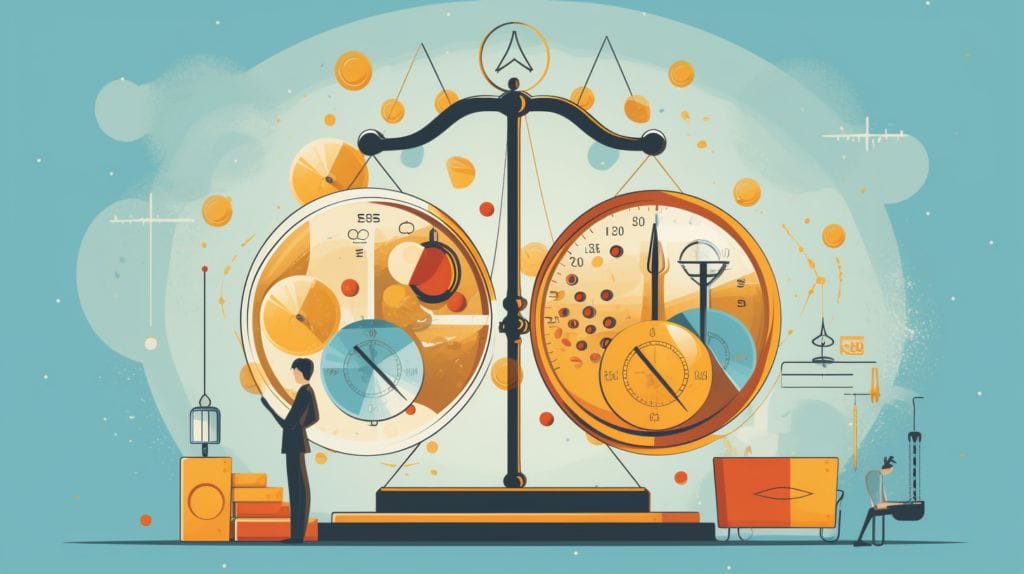The question frequently posed; ‘Can time management be considered a soft skill?’ has a straightforward response, without a doubt, yes!
In this article, we’ll delve into the importance of time management as a soft skill. We’ll explore why it’s crucial, especially in project management, and I’ll share some tips to enhance your time management skills.
Let’s kick off this journey to mastery together!
Key Takeaways
- Time management is a fundamental soft skill highly valued in the workplace.
- Effective time management leads to meeting deadlines, achieving goals, and reducing stress.
- Time management involves prioritizing tasks, setting goals, and efficiently using resources.
- Mastering time management enhances communication, coordination, and teamwork skills.
Understanding Soft Skills: Where Does Time Management Stand?

Let’s start by understanding soft skills and their value in today’s work scenario.
Then, we’ll make a case for why time management is a critical part of these soft skills.
Lastly, we’ll distinguish between hard skills and soft skills, specifically focusing on where time management fits in.
The Necessity and Value of Soft Skills in the Modern Workplace
Often, I’ve noticed that soft skills, including time management, are increasingly valued in today’s dynamic workplace. Management is considered a soft skill, with employers recognizing its importance.
Soft skills are in high demand, and for good reason. They’re the grease that smooths the gears of commerce, facilitating cooperation and efficiency. The importance of soft skills can’t be overstated. They help us navigate complex situations, understand and meet client needs, and foster a positive work environment.
These skills in the workplace, particularly time management, are critical for success. Not only do they improve productivity, but they also enhance job satisfaction, leading to a more engaged and motivated workforce.
As a result, mastering soft skills is a valuable investment for any professional. Time management is a life skill that can be applied in various aspects of one’s life, including allocating specific time windows for essential tasks and creating more personal time to spend more time with family and friends.
Time management helps you use your time wisely and save time, which is a crucial part of time management.
Making the Case for Time Management as a Fundamental Soft Skill
In my experience, nearly all successful professionals regard time management as a fundamental soft skill. They understand that it’s not just about managing time but about prioritizing tasks, setting goals, and efficiently using available resources.
So, is time management a soft skill? Absolutely, and here’s why. Soft skills include abilities that one can’t necessarily learn from a book – they’re about how you interact with others and manage your work. Time management is a skill that falls under this category.
It’s an essential soft skill that influences how effectively you carry out tasks and meet deadlines. Therefore, recognizing time management as a soft skill is vital for professional success.
Differentiating Between Hard Skills and Soft Skills Like Time Management
I’ve come to realize that differentiating between hard skills and soft skills can be challenging, and understanding where time management fits in can be complex.
Hard skills are technical or specific abilities you can teach, like coding or data analysis.
On the contrary, soft skills like time management are more intangible, relating to how we interact and work with others.
So, is time management considered a soft skill? Yes, it is! It’s about prioritizing tasks, setting goals, and maintaining focus – all attributes that affect how we work in a team and lead others.
Soft skills allow you to thrive in various aspects of life, unlike hard skills, which are technical and job-specific. Time management skills are also a big part of time management, as they help you allocate the right amount of time to tasks and meet specific time frames effectively.
It’s a soft skill because it cannot be taught in the same way as hard skills, but time management can help you gain additional skills that can last a lifetime. Recognize that these skills must be nurtured and developed over time.
Why Time Management Is Considered a Soft Skill

Let’s now explore why time management is considered a soft skill.
We’ll start by considering its relationship with critical soft skills like communication and teamwork.
Then, we’ll look at the cognitive and emotional aspects involved in effective time organization.
We’ll also present some data showing how good time management can lead to success in the workplace.
Unveiling How Time Management Interfaces with Vital Soft Skills, Such As Communication and Teamwork
I will explore how time management interacts with crucial soft skills like communication and teamwork, illustrating why it’s considered a soft skill in its own right.
When you sharpen your time management skills, you’re not just enhancing personal productivity. You’re facilitating smoother communication by respecting others’ time and ensuring deliverables are met promptly. This is why management is considered a soft skill. It’s about people as much as it’s about tasks.
In teamwork, key time management becomes critical to coordinating efforts and meeting shared goals. Given that soft skills are in high demand in today’s dynamic work environment, mastering time management is a soft skill that can set you apart.
Outlining the Cognitive and Emotional Aspects Employed in Good Time Management
I’ll delve into several cognitive and emotional aspects involved in effective time organization, illustrating why it’s not only a practical ability but also a soft skill.
Good time organization requires cognitive skills like planning, decision-making, and problem-solving. It demands a clear understanding of your tasks, their importance, and the ability to prioritize.
On the emotional side, stress management is vital. Managing your time effectively can reduce stress levels and enhance work-life balance.
Soft skills can follow from improving your time management as it fosters patience, discipline, and self-control.
Time management is a soft skill that intertwines with other critical soft skills. It’s not just about ticking off tasks. It’s about managing yourself.
Sharing Data Highlighting the Positive Correlation Between Time Management and Workplace Achievements
Based on the data I’ve gathered, there’s a significant positive correlation between effective time organization and notable workplace achievements.
When you manage your time effectively, you’re more likely to meet deadlines, achieve goals, and exceed expectations. This is why time management is considered an essential skill in the professional world.
The benefits of good time organization are undeniable. It can help reduce stress, improve your performance, and even enhance your work-life balance.
Moreover, time management skills can help you become more organized, productive, and efficient.
These soft skills can be applied to various aspects of your professional life, demonstrating the soft skills you’ve shown.
Time management is not just a workplace necessity; it’s a life skill that can give you more space to spend more time on things that truly matter.
Three Reasons Why Time Management Is an Important Soft Skill

Let’s explore why time management is such an essential soft skill.
Firstly, I’ll highlight how good time organization can boost personal and professional productivity.
Then, we’ll look at its role in stress management and work-life balance.
Showcasing How Excellent Time Management Can Significantly Improve Personal and Professional Productivity
I’m going to delve into how honing time management skills can dramatically boost both your personal and professional productivity. When time management is considered a soft skill, its importance is often underestimated. But mastering it can trigger a significant improvement in your life.
- Showcasing how excellent time management can significantly improve personal and professional productivity, you can accomplish more in less time.
- When you improve your time management skills, you’ll reduce stress and increase your potential for success.
- Effective time organization allows for better work-life balance, enhancing your overall satisfaction.
- When you manage your time wisely, you’re not just working hard. You’re working smart.
In essence, mastering time management is a game-changer, transforming how you live and work.
Revealing How Time Management Aids Stress Management and Work-Life Balance
Although many might overlook it, when you effectively manage your time, you also enhance your ability to manage stress and achieve a healthy work-life balance. Time organization is a critical skill for those seeking to lead a balanced life.
Here’s a table summarizing how time management skills help:
| Time Management Benefits | Stress Management | Work-Life Balance |
| Prioritization | Reduces overwhelm | Focus on priorities |
| Planning | Allows control | Time for relaxation |
| Delegation | Shares load | Time with family |
| Efficiency | Reduces burnout | Personal fulfillment |
With these in mind, let’s remember that those who manage their time efficiently are not just more productive, they’re also less stressed and more satisfied with their work-life balance. It’s clear, then, that mastering time management is a win on all fronts.
Discussing the Influence of Time Management on Career Progression
While it’s often underestimated, time management drastically influences career progression for three key reasons.
- Firstly, effective time organization is a crucial management skill that enables professionals to meet deadlines and achieve project management objectives.
- Secondly, essential time management skills can set you apart from colleagues in the competitive corporate world.
- Thirdly, the ability to manage and prioritize tasks indicates to employers that you can handle responsibility, which often leads to career advancement.
- Lastly, understanding how to improve time management skills can increase productivity and reduce stress, impacting job performance positively.
In essence, time organization as a soft skill is about more than just getting more done. It’s about getting the right things done in the proper order and at the right time.
The Benefits of Good Time Management in Project Management

Let’s now consider the advantages that proficient time management can bring to project management.
We’ll discuss how effective time organization can lead to successful project outcomes, assist in better resource allocation, and aid in risk management.
We’ll also look at some real-life examples to show how significantly time management can impact project delivery.
How Effective Time Organization Contributes to Successful Project Outcomes
Effective time organization can be a crucial factor in the successful outcome of a project. When management is considered a soft skill, practicing good time organization becomes even more prominent.
In my experience, here are the top benefits:
- Improved efficiency: By planning and avoiding procrastination, I can complete tasks faster and more effectively.
- Better decision-making: With time management, I can allocate sufficient time for thoughtful decision-making.
- Less stress: Proper scheduling helps to avoid last-minute rushes and lowers stress levels.
- Greater project success: Ultimately, effective time organization contributes to successful project outcomes by ensuring tasks are completed on time and within budget.
Indeed, time management is a critical soft skill that can significantly enhance a project’s success.
Time management will help in achieving the desired project outcomes, as it ensures tasks are completed on time and within budget.
Time management also plays a crucial role in avoiding last-minute rushes and reducing stress levels.
It is different from hard skills, as soft skills are non-technical and job-specific, whereas hard skills are technical and job-specific.
Time Management Assists in Better Resource Allocation and Risk Management
Surprisingly, as I’ve honed my time management skills, they also assist in better resource allocation and risk management within projects. When I consider the benefits, time management is a critical skill in project management.
The ability to manage your time efficiently means you can allocate resources more effectively, reducing the risk of overruns and delays. This makes time management an integral part of successful project completion.
Furthermore, good management skills are also essential to identify potential risks early, allowing for timely mitigation strategies. So, time management assisting in better resource allocation and risk management is an absolute game-changer in project management.
It’s not just a soft skill but a cornerstone of success.
Case Studies Exemplifying the Impact of Time Management on Project Delivery
Good time organization has proven indispensable in project delivery, and I’ll illustrate this by sharing some compelling case studies.
Time management is a critical skill that, when applied effectively, can significantly enhance the success rate of projects.
- In a software development project, the team delivered the final product a week earlier than expected. Effective time organization was the process that helped them in achieving this feat.
- A construction project was facing delays due to unforeseen circumstances. But, the project manager’s ability to manage time effectively helped to get the project back on track.
- An event management project went smoothly owing to good time management skills.
- In a marketing campaign, managing time well leads to successful campaign execution within the deadline.
These examples show that these skills can help in project delivery.
Enhancing Your Time Management Skills: Practical Tips

So, you’re keen on enhancing your time management skills, aren’t you?
Let’s start by discussing some practical techniques you can use at your workplace.
After that, we’ll talk about handy tools and apps that can help you manage your time better.
Techniques for Improving Time Management at the Workplace
How can we boost our productivity and efficiency by mastering time management skills at work? Understanding that time management is a soft skill that’s in high demand, we can adopt several techniques for improving time management in the workplace.
Here are my tips:
- Prioritize your tasks: Focus on what’s most important first.
- Break down tasks: Tackle large tasks into smaller, manageable parts.
- Avoid multitasking: It’s better to concentrate on one task at a time.
- Use tools: Plenty of apps can help you manage your time effectively.
Management skills are also vital to enhancing your productivity. It’s often said that one of the best ways to improve your time management is to learn from others who’ve already mastered this skill.
Tools and Apps that Can Support Efficient Time Management
While I’ve found many tools and apps can be effective in enhancing time management skills, it’s crucial to choose those that best fit your individual needs and work style.
For me, time management is an integral part of my daily routine. It’s not just a theoretical concept; it’s a practical skill that I’ve honed over time.
Using apps like Trello for task organization and RescueTime for tracking time spent on various activities, I’ve improved my productivity drastically.
These practical skills allow me to handle my workload more efficiently.
Strategies for Fostering a Lifelong Habit of Good Time Management.
I’ve got five critical strategies for fostering a lifelong habit of good time management, and they’ve genuinely revolutionized the way I handle my day-to-day tasks. Time management is a soft skill, but like all essential skills, it needs to be nurtured and developed.
Here’s how I’ve done it:
- Prioritizing tasks: Focus on what’s truly important and let go of the rest.
- Setting realistic goals: Understand your capacity and don’t overcommit.
- Avoiding procrastination: Tackle the challenging tasks when you’re at your best.
- Regular self-reflection: Review your progress regularly and adjust as necessary.
These strategies have enhanced my ability to manage time effectively. Remember, skills must be nurtured, and these strategies for fostering a lifelong habit of good time management are a great place to start.
Frequently Asked Questions
What Are Some Common Misconceptions About Time Management as a Soft Skill?
Some common misconceptions I’ve encountered include the idea that time management can’t be learned or that it’s just about making to-do lists. It’s far more comprehensive, involving prioritization, goal-setting, and self-awareness.
Are There Any Specific Industries or Professions Where Time Management Is Not Considered as Vital?
There isn’t any industry or profession where time management isn’t crucial. Every role benefits from effectively managing time, whether it’s meeting deadlines, prioritizing tasks, or balancing multiple responsibilities.
Can Time Management Skills Be Inherited or Are They Completely Learned?
In my view, time management skills aren’t inherited but wholly learned. It’s about discipline, planning, and the ability to prioritize tasks, all skills that can be developed with practice and commitment.
How Does Poor Time Management Impact Personal Relationships Outside of a Professional Setting?
Poor time management can strain personal relationships. If I’m always late or cancel plans at the last minute, people may feel I don’t value their time. This can lead to frustration and potentially damage relationships.
Are There Any Negative Consequences of Over-Emphasizing Time Management Skills?
Over-emphasizing time management can lead to stress and burnout. It’s essential to strike a balance – managing your time effectively and allowing for flexibility and downtime in your schedule.
Conclusion
In conclusion, time management is more than just a soft skill. It’s an essential one. It’s the keystone that holds other skills together, making you more productive and efficient.
Whether you’re handling a project or juggling everyday tasks, good time management can be a game changer. So, take steps to enhance your time management skills. Trust me, the benefits are worth the effort.
Remember, time is the most precious resource we have; let’s not waste it.

